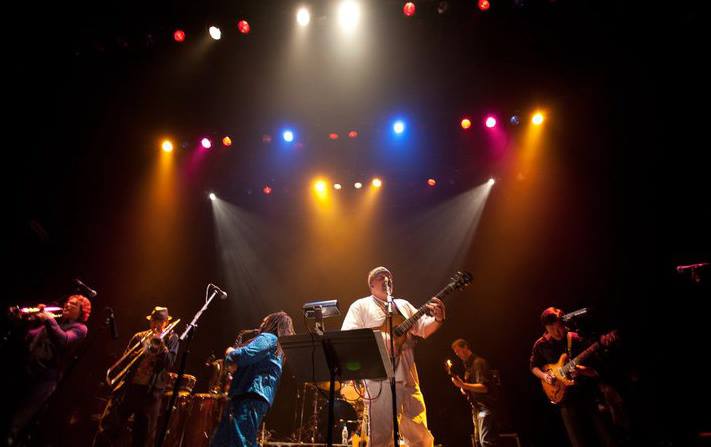When local musician Jay Pun watched worldbeat band Baaba Seth take the stage decades ago, it was one of the few times he saw someone who looked like him making music that audiences loved.
“Standing at the front of the … Pavilion and seeing Mike on stage, it was cool to see another Asian guy playing music in Charlottesville,” Pun says. “I didn’t really know how much it meant to me at the time. But it really did mean a lot.
It’s been at least 25 years since Pun would’ve first seen “Mike,” aka Michael Chang, play with Baaba Seth. And it’s been more than 30 years since the band formed in 1991.
Back in those days, Pun says he thought Baaba Seth was destined to be bigger than Dave Matthews Band. He wasn’t alone. The band’s combination of improvisational sensibility and global grooves made it a prime candidate to storm the jam scene—and even cross over into pop stardom.
As they say, the rest is history. DMB went on to become the only band ever to have seven consecutive studio albums debut at number one on the Billboard 200. Baaba Seth had some success, gaining renown in central Virginia, touring the East Coast extensively, and catching the eye of major record labels. But the band essentially broke up in 2000, and its eight members went their separate ways.
On August 18, the Baaba Seth bandmates will do what they’ve done almost every year since just a few years after their breakup. They’ll get back together to play one show, this one at The Southern Cafe & Music Hall, with their original lineup.
“It’s a different kind of band, unlike any others I had been in as far as our approach and style,” Chang says. “For me, and I think a lot of my bandmates would agree, that’s what keeps us coming back. It’s just fun to play with everyone, and the other part is people still give a crap—they want to hear our music.”
In addition to Chang on lead guitar and backing vocals, Baaba Seth features Dirk Lind on lead vocals and rhythm guitar, Hope Clayburn on sax, flute, and vocals, Dylan Locke on bass, Jim Ralson behind the drums, Len Wishart providing more percussion, Mark Maynard playing trombone, and Tim Lett on trumpet. That’s eight players with unique musical backgrounds, still playing together 32 years after finding one other in the electric, early-1990s Charlottesville music scene.
Perhaps it’s not surprising that the biggest setback for the band—essentially frozen in time and thawed out annually—over the past two decades was COVID-19. From 2003 to 2018, the annual Baaba Seth reunion shows marched forward in 4/4 time. But when the octet decided to take a short break in 2019, they found themselves offbeat for the next four years.
The 2023 show will essentially be the band’s third coming, and Chang expects it to be big.
“I don’t know that Baaba Seth is going to try to reinvent itself—it is not a going concern,” Chang says. “But since we’re doing more rehearsals, maybe we’ll try to bust out something we haven’t done in a while or a new composition. There might be a few surprises.”
Indeed, Baaba Seth hasn’t been in complete cryogenic stasis for the last 20-plus years. They have a handful of songs written and arranged after they officially broke up, Chang says. And each band member is still involved in the music industry in some capacity. Clayburn, for example, plays regular solo shows with her backing band. Accordingly, Baaba Seth will occasionally mix in a Clayburn composition, Chang says. “As long as we follow her lead, it ends up being a party,” he says.
Recently, there’s even been talk of Baaba Seth returning to the studio for the first time in two decades. “It doesn’t take anything but getting together,” Chang says. “But even that is difficult with such a large band.”
Fans might think the biggest concern for a band more than three decades in, with eight members doing their own thing 364 days of the year, would be finding its groove on that 365th day. Aren’t there times when they take the stage and find they’re just out of synch? Times when their own experiences, both musical and otherwise, have broken the wavelength they all once shared?
“We’ve never had that problem. We’ve played so many times in that configuration on the stage, and it feels like no time has passed,” Chang says. “When we have some preparation and line up in that configuration, it’s like a muscle memory thing. Even if we go to far-flung places … we drove around in a van together for so long, those memories don’t go away.”
Opening for Baaba Seth on August 18 will be another band featuring Chang, Afro Asia. Founded by Pun, the five-piece fuses traditional Thai music with funk and soul. Pun conjured the project after buying a stringed Thai instrument known as a phin on a trip to his mother country. In addition to Pun on phin and Chang on guitar, bassist Houston Ross, keyboardist Ivan Orr, and drummer Kofi Shepsu round out the band.
For Chang, Afro Asia’s vibe isn’t all that different from Baaba Seth’s. It’s “a reunion of old friends playing heady music,” he says. And for Pun, it’s a chance to come full circle and play with a bunch of guys who look like him.
“At first, it was intentional to have Black and brown members—if not really a rule,” Pun says. “And in bringing some of this traditional yet modern Asian music to America, it works because it is heavily influenced by Black American funk and jazz.”
